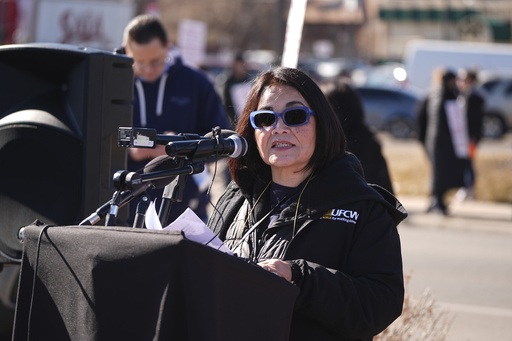
Approximately 10,000 grocery store employees in the greater Denver region initiated a strike on Thursday, contesting what they describe as unfair and unlawful negotiation tactics employed by King Soopers during ongoing contract discussions. The strike involves workers from 77 King Soopers locations, including those in Denver, its suburban areas, and in Boulder and Louisville, Colorado. Participants have requested that customers refrain from crossing the picket lines, which began forming in the early morning hours.
In a letter sent to union members on Monday, Kim Cordova, President of the United Food and Commercial Workers International Union Local 7, emphasized the importance of solidarity, encouraging members to “Stand together. Stay strong.” Last week, a significant 96% of UFCW Local 7 members voted in favor of authorizing the strike in response to perceived unfair labor practices.
King Soopers, part of the Kroger family and operating 121 stores across Colorado and Wyoming, has been engaging in contract negotiations since October, when the previous contract expired in January. According to King Soopers spokesperson Jessica Trowbridge, the striking stores will remain operational but will operate on a reduced schedule, opening one hour later and closing two hours earlier than normal.
Cordova has accused King Soopers of hiring staff from outside the state to replace striking workers. Meanwhile, stores in northern and southern Colorado, as well as Cheyenne, Wyoming, which are not affected by the strike, will maintain their usual operating hours, as confirmed by Trowbridge.
The union claims that King Soopers has engaged in illegal activities such as interrogating and monitoring union members, failing to provide necessary information during negotiations, threatening disciplinary actions against members for showing support for the union through clothing and buttons, and attempting to utilize $8 million from retiree health benefit funds to finance wage increases.
In response, King Soopers has refuted all allegations, asserting that it has acted lawfully and fulfilled its obligations under collective bargaining agreements. The management asserts that it has made extensive efforts to provide the union with pertinent information and is dedicated to fair negotiations, disputing the claim that it plans to diminish retiree health benefit funds.
King Soopers President Joe Kelley clarified in a statement that the union’s strike call is not centered on issues related to wages, healthcare, or pensions, but rather on allegations the company believes are unsubstantiated. Kelley further noted that the strike may lead to increased prices for customers at competing stores and those with nonunion employees.
This strike is part of a broader trend of labor actions occurring across the United States. In a related incident, the Teamsters union and Costco reached a tentative agreement last week to avert a strike. Additionally, approximately 200 union ski patrollers at Park City, the U.S.’s largest ski resort, ended a nearly two-week strike on January 9 after negotiating for higher wages, particularly for senior patrollers.
Recent months have seen labor unions secure significant concessions from employers following other strikes involving Boeing factory workers, dockworkers at various East and Gulf Coast ports, video game performers, and hospitality staff on the Las Vegas Strip.

